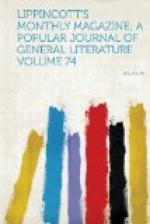“Well, if she represented England I should drop England quietly over the rapids some day when I could no longer stand her infernal patronizing, impertinent airs, and rid the world of a nuisance,” said Mr. Ketchum, with energy. “Excuse my warmth, but that woman would poison a prairie for me. Fortunately, I happen to know that she only represents a class which neither Church nor State there has the authority to shoot, yet, and I am not going to cry down white wool because there are black sheep. Look at Sir Robert, and Miss Noel, and all the rest of them, how different they are.”
Captain Kendall certainly found Niagara delightful, for, owing to the absorption of the party in their different pursuits, he was able to see more of Ethel than he had ever done. He was so different from the men she had known that he was a continual study to her. Instead of the studied indifference, shy avoidance, shy advances, culminating in a blunt and straightforward declaration of “intentions,” which she would have thought natural in an admirer, followed by transparent, honest delight in the event of acceptance, or manly submission to the inevitable in the event of rejection, Captain Kendall had surprised her by liking her immediately, or at least by showing that he did, and seeking her persistently, without any pretence of concealment. He talked to her of politics, of social questions in the broadest sense, of books, scientific discoveries, his travels, and the travels of others. He read whole volumes of poetry to her. He discoursed by the hour on the manly character, its faults, merits, peculiarities, and possibilities, and then contrasted it with the womanly one, trait for trait, and it seemed to her that women had never been praised so eloquently, enthusiastically, copiously. At no time was he in the least choked by his feelings or at a loss for a fresh word or sentiment. Such romance, such ideality, such universality, as it were, she had never met. When his admiration was most unbridled it seemed to be offered to her as the representative of a sex entirely perfect and lovely. Everything in heaven and earth, apparently, ministered to his passion and made him talk all around the beloved subject with a wealth of simile and suggestion that she had never dreamed of. But, if he gave full expression to his agitated feelings in these ways, he was extremely delicate, respectful, reserved, in others. He wrapped up his heart in so many napkins, indeed, that, being a practical woman not extraordinarily gifted in the matter of imagination, she frequently lost sight of it altogether, and she sometimes failed to follow him in a broad road of sentiment that (like the Western ones which Longfellow has described) narrowed and narrowed until it disappeared, a mere thread, up a tree. If he looked long, after one of these flights, at her sweet English face to see what impression he had made, he was often forced to see that it was not the one he had meant to make at all.




